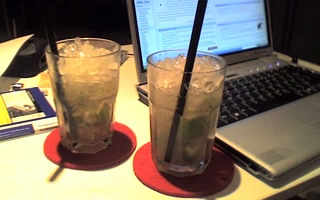
Attendees at the fifth Science & Cooking Public Lecture take a whiff of sample cocktails prepared by guest lecturer Grant Achatz.
With ingredients like flaming gin and tonic powder, liquid nitrogen-aided artificial snow, and a towering hibiscus leaf garnish, chef Grant Achatz is not just reinventing the cocktail, but dramatically shocking it back to life.
Achatz’s wildly creative craft was on display Monday night at the Science Center, where he was an invited guest speaker for the evening lecture series of Science of the Physical Universe 27: “Science and Cooking: From Haute Cuisine to the Science of Soft Matter.”
Already one of the most popular courses offered by the College, the associated lecture series, which is open to the general public, is attracting large crowds from all over the Boston area. The 350-seat auditorium filled to capacity just minutes after doors opened, with some eager foodies lining up as early as 5 p.m. for the 7 p.m. event.
Achatz, who won the James Beard Foundation’s highly prestigious “Best Chef in the United States” award in 2008, showed off a few of his culinary innovations in a presentation that was part Food Network, part SyFy.
“[I’m] trying to craft a very emotional experience, and just so happen to be using food to do it,” he said of his culinary motivations.
Much of his work—such as powdered liqueur and drinks that change flavor over time—seems more at home in a Harvard chemistry lab than a bar. For example, Achatz explained the process of creating a solid cocktail, which involves removing the air from the foodstuff in question and replacing it with liquor via an elaborate mechanical process of compression and fluid extraction. Attendees were lucky enough to taste the result: under every seat was a small paper box containing a chunk of pineapple infused with cucumber, gin, and chartreuse.
“We had to embrace science and technology in order to manipulate the foodstuffs in new, exciting ways,” Achatz explained to a spellbound audience.
For the scientists in the audience, Science and Cooking professor David A. Weitz gave a short lecture detailing the more technical aspects of crafting specific textures in food, emphasizing concepts such as viscoelasticity and polymer cohesion.
Aschatz’s futuristic bartending was lauded by scientists and aesthetes alike.
Boston-area chef Michael Zenter said he enjoyed the presentation, describing it as “very informative.”
Said Kieran A. McLaughlan, a student at the Massachusetts Institute of Technology and self-identified foodie, “I wanted to see great chefs go to work and knew this was the place to do it.”
Read more in News
Violence Decreasing, Pinker SaysRecommended Articles
-
HOUSE BASKETBALL TO HOLD FIRST PRACTICEWith a considerable number of men from the defunct Junior Varsity, in addition to the regular enthusiasts, expected to report.
-
Message in a BottleBut the utility of letters is not limited to cowardly break-ups. It seems to me an art that is slowly fading, and I lament its demise not because I’m a sentimental and nostalgic Luddite (though I am), but because there are real and pragmatic reasons for holding onto an anachronistic tradition.
-
Juice BoxWith both the holidays and finals approaching, FM is combining our traditional Jukebox and Drinky Drink features into a tasty Juice Box. Pour yourself a drink to help you get through your projects, papers, and predicaments while still getting into the holiday spirit—no straw required.
-
 Drinky-Drink: Harvard-Yale
Drinky-Drink: Harvard-Yale -
 Juicebox: Drinks and Tunes for Midterm Season
Juicebox: Drinks and Tunes for Midterm Season













